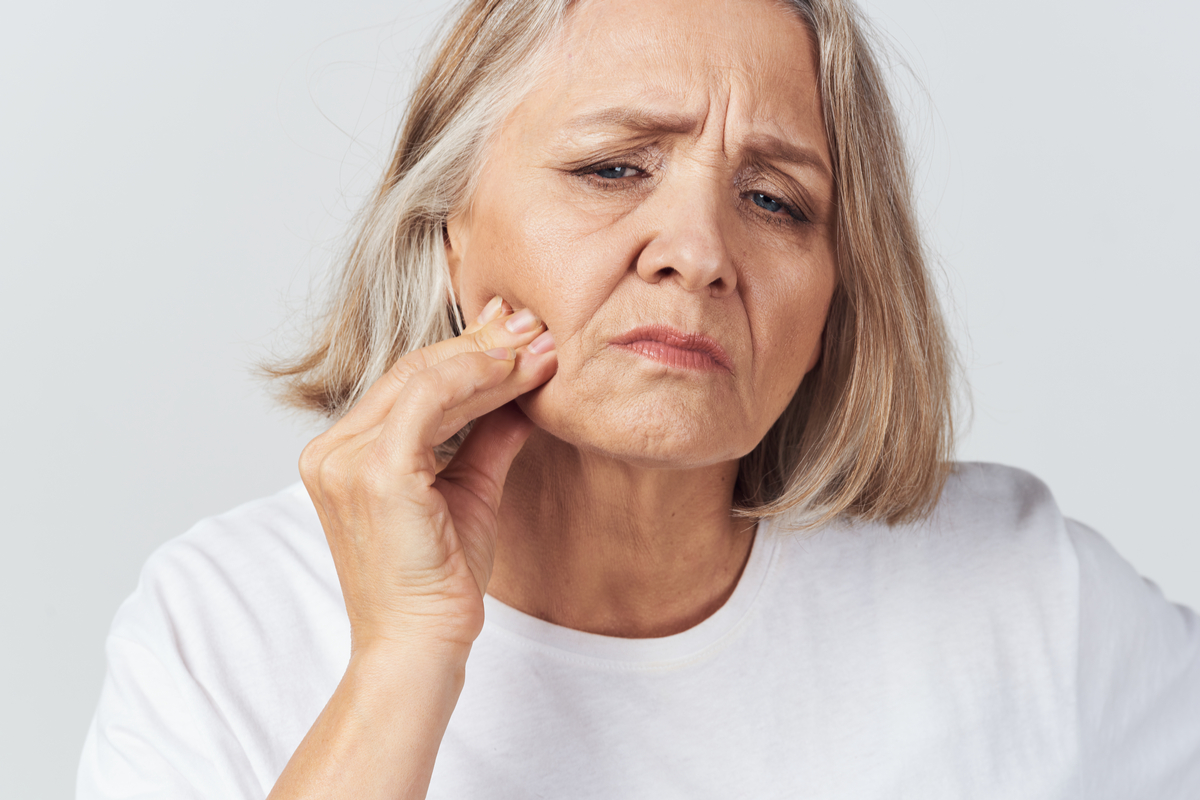Bad Breath? This Could Be the Reason
It’s an embarrassing problem to have—one that no one wants to admit to. Nevertheless, everyone asks themselves this question from time to time: “Does my breath stink?” The particularly breath-paranoid among us may be in the habit of carrying mints, gum, and even a travel toothbrush wherever we go, and some have even been known to breathe into a trusted loved one’s face and ask them for the truth. (Hey, you’ve gotta do what you’ve gotta do.)
Women over 45, especially, are prone to suffering from bad breath, otherwise known as halitosis—and it may not have anything to do with whether they’ve eaten onions recently, or brushed their teeth thoroughly enough, or used mouthwash. If you’re struggling with this problem, there’s no reason to be ashamed; the unpleasant fumes coming from your mouth are likely not your fault at all. Read on to find out what could be giving you that stubborn dragon breath, and how to combat it.
RELATED: If Your Breath Smells Like This, Get Your Liver Checked, Experts Say.

Onions and garlic get a bad rap for causing bad breath, and while this is true, a dry mouth may be more often to blame. And for menopausal women, a so-called “cotton mouth” comes with the territory because of the drop in estrogen levels during this time. This leads to notorious symptoms like hot flashes, night sweats, moodiness, and a foggy memory. But a lesser known side effect of this hormonal shift is lessened saliva production, which can leave you with some foul breath.
“I’ve had several patients experience dry mouth and bad breath due to menopause,” says Whitney Rose DiFoggio, RDH, BS (also known as YouTube’s “Teeth Talk Girl“). “This is primarily due to the lack of estrogen, which can have the side effect of xerostomia, also known as dry mouth.”
Menopause isn’t the only time hormones can play havoc with your breath, either. The onset of menstruation, pregnancy, and things like taking hormonal birth control can all affect your saliva production—and therefore your breath. “Saliva is important to mouth health because it washes away bacteria and food,” explains Venus Patti, DDS. “A dry mouth can cause bad breath and tooth issues.”
Basically, anytime your estrogen levels are out of whack, you might notice your mouth getting dry, and your breath getting a little stinky.

While hormonal changes are a common culprit of halitosis, it’s important not to assume that this is the cause—even if you’re a woman going through menopause. Other causes of bad breath include tonsil stones (this is when food particles get stuck in your tonsils and harden into foul-smelling calcium deposits), gum disease, diabetes, sinus infections, and even cancer, according to The Cleveland Clinic.
Of course, the number one reason for bad breath is poor oral hygiene, so make sure the first step you take in combatting bad breath is brushing your teeth at least twice a day, flossing regularly, and using mouthwash. Not sure which order to do it all in? Todd Shatkin, DDS, told Today that flossing should come first, and that you should do it for a full five minutes before brushing. However, Catrise Austin, DDS, told the show that it really doesn’t matter. “I don’t care what order you do it, just do it,” she said.

Bad breath is annoying and embarrassing, to be sure, but there are more serious issues at play for women going through menopause. The decline in estrogen causes two primary changes of concern to dentists, Patti explains: dry mouth and bone loss. “As many as 25 percent of post-menopausal women face an increased risk of losing teeth,” says Patti. “They are also at risk for gum disease and tooth decay.”
Patti suggests that women talk to their doctor about treatments to prevent tooth loss. “New research also indicates that hormone replacement therapy (HRT) can help prevent many post-menopausal issues like reduced bone density,” she says. “That will help in reducing the risk of tooth loss and gum disease.”
RELATED:
For more up-to-date information, sign up for our
daily newsletter.

Gum and mints can only go so far in masking a hormone-driven case of halitosis. In addition to practicing good oral hygiene (flossing, brushing, and using mouthwash), drinking plenty of water can help keep you hydrated and make your dry mouth feel better. “Water helps lubricate your mouth and gives your body the liquid it needs to turn around and produce more saliva,” explains DiFoggio.
And of course, regular dental visits are key. “Post-menopausal women should pay more attention to their oral health by seeing their dentist regularly and keeping up with fixing issues as they arise,” says Patti. “Getting diagnosed early when it comes to gum or periodontal disease is key to resolving them.”
Healthline advises that sleeping with your mouth open can also contribute to bad breath. Also, stay away from tobacco, which is notorious for causing bad breath. If the problem persists, don’t be embarrassed to bring it up with your doctor or dentist. They can help!
RELATED: This Is the Absolute Worst Time to Brush Your Teeth, Dentists Say.
" Conservative News Daily does not always share or support the views and opinions expressed here; they are just those of the writer."

Now loading...